I often find inspiration for various life goals in the most unexpected places. Most recently it was a visit with our friends who live in the countryside where one comment, after sinking in and ruminating for a few days led to two weeks of research, number crunching and spiralling off into many rabbit holes…and the ideas keep coming. This post covers the many shortcuts to financial independence I analysed.
I share these ideas in the hopes that it changes your perspective and help you to start living your best life now rather than pursuing full financial independence in a fury only to get to a possibly anti-climactic end.
So, what was that comment? That they never thought they would have liked living in the countryside after being in the city for so many years, but now they wouldn’t have it any other way. And that you get twice the house for the same price as the city.
My initial reaction was that I grew up in a very remote and rural area (like 40 minute drive to get your groceries) and could not see myself ever living in that setting again (though never say never). I also didn’t want a bigger house, as even the one we have now is too big with probably half of it unused on a regular basis as it is. That said, their house is absolutely sickeningly gorgeous with huge windows and sprawling country views.
Anyway, a few days later a thought occurred to me. “What kind of a house could we buy in the cheapest area of the country?” The cheapest area is currently Longford according to Daft reports. So onto Daft and down the rabbit hole I went.
First I searched for houses under 75,000€ with BER ratings of C or higher in all of Ireland. This is equity we could free up which would allow us to buy in cash and be mortgage free. Believe it or not there are some homes that match that criteria. Each one I found then led to further searches on the distance between them and our friends and family around the country as well as commute distance to nearest cities for professional level jobs.
Then out of curiosity I thought, what if once we reach FI, we sell our place in Cork and move to Longford where we could be mortgage free resulting in requiring a smaller pot of money to sustain us. I say Longford as although it is close to no one we know, it is more central to everyone. It would take under 1h 45 mins to get to Dublin Airport. It’s also under 1h 45min from most of our friends and family ranging from Galway, Mayo, Sligo, Dublin and Wicklow. Though further from our Cork gang.
Unfortunately I found a place that I absolutely love and would like to buy now. Even though it is more than twice the price of other homes in that area. This one is fully furnished, professionally designed and on a marina where you have your own berth (perfect for my kayaks!). That said, I have since managed to convince myself not to proceed with this idea since in 2016 a twister passed through there. I’m really wary of more extreme weather events happening as the climate crisis ramps up so I’d like to stay somewhere a little less exposed to the elements. Not to mention I doubt you’d get flood insurance being that close to the water!
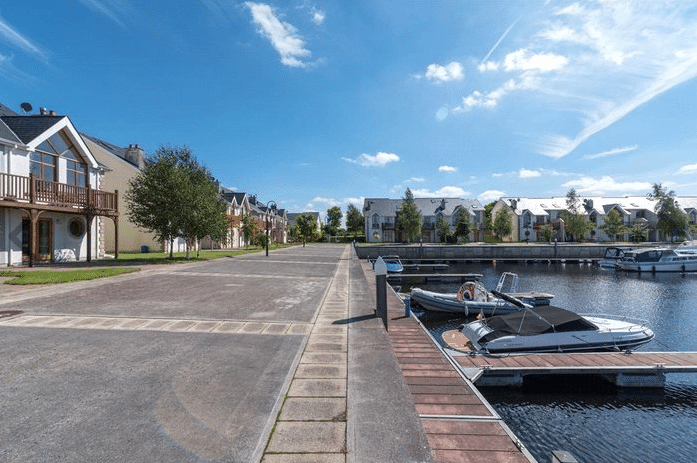
And so on and so forth, you get the idea.
Now I’ll try to summarise the options I analysed. I’ll also include how long it would take for us to get there.
Assumptions/Caveats
I will preface this by saying that most of these timelines are from a starting point of about 25% to full FI. You can have a look and see if some of these options could move your goal posts up a few years. These are also looking at options for a family with one child so you may need to tweak things for a single person or couple without kids. However most of the concepts should still apply and may even take less time to achieve as you won’t have to account for childcare expenses etc.
I’ll also say that unless stated otherwise most of these are looking at half of our assets in tax efficient Canadian investments and the other half in tax heavy Irish domiciled ETFs and shares without the use of a pension. I only looked at the growth phase for now and have not looked at the withdrawal phase in any of these scenarios. I’ve assumed a safe withdrawal rate of 4% but safer in Ireland at 41% tax on gains and dividends would likely be 3.5%.
Traditional paths to FI
My research began with the traditional, both work until we reach FI approach, along with numerous variables thrown in.
Both work to full FI
This includes putting our son into childcare and school once he is school aged. It also includes staying in our current home both, on the path to, and after reaching FI. It also means that we’d have about 100,000€ in equity tied up in our home once we reach FI (not accounting for home price increases or decreases) – which could bring in another 4,000€ in passive income if it was invested elsewhere, but we need to live somewhere and we’d be hard pressed to find somewhere for that price at this standard in Cork if that’s where we end up wanting to stay.
Annual expenses: 50,000€ pre early childcare scheme, 46,500€ post ECCE until school, then 37,000€ once in school
Income to supplement once FI: 37,000€
Years to full FI without a pension: 8.75 years
Years to half FI without a pension where half our expenses are covered and one person can stay off or both work part-time: 3.75 years
Years to full FI WITH a pension: 6 years
Years to half FI WITH a pension where half our expenses are covered and one person can stay off or both work part-time: 2.75 years
A note about pensions: while these are definitely the most tax efficient way to invest in Ireland (once you can keep your management fees to 1% or less and you can self direct the investments to match the performance of non-pension funds) – you can only access them at 50 at the earliest if you have a private pension, meaning for me, even if I could get to my FI number much quicker using a pension, I’d need to have significant investments outside of the pension in order to draw down on those to bridge the gap of 10 to 13 years.
This complicates the draw down a bit too much for me. There are also tax implications which don’t work out for me which I will go into in another post. Not to mention, I’m not a fan of the requirement to withdraw 4% from age 61 and 5% from age 71 (and pay income tax on that sum) regardless of whether you need it or not.
Both work to full FI while renting out our spare room
I also looked at the above option where we rented out our spare room at 140€/week – side-note: It always annoyed me when listings showed weekly rates but I finally figured out why. Some months have 5 weeks so 140€*4 weeks = 560€/month or 6,720€/year but if you take 140€*52 weeks you get 7,280€ which is an additional 4 instalments! – Anyway, renting the spare room only knocked off 6 months at best so we would be sharing our living space for 8.25 years in order to be financially free 6 months sooner. For us that sacrifice is just not worth it and so we have ruled out renting our spare room.
Years to full FI without pension: 8.25
Years to full FI WITH pension: 5.75
Years to half FI WITH a pension where half our expenses are covered and one person can stay off or both work part-time: 2.5
Both work to full FI but splitting where we live to reduce expenses, not renting our home
I then looked at the idea of how long it would take to get to full FI if, once we got to a certain point, we could live for 6 months in our current home and live the remaining 6 months (winter) somewhere warmer and cheaper and preferably with better tax advantages like Portugals 10 year tax free foreign income option (for as long as that lasts). Anyway that would bring our annual expenses down from 37,000€ to 30,000€ (37k/2 = 18.5k for 6 months in Ireland, 20k/2 = 10k for 6 months abroad, 1,700€ extra for annual expenses like insurance policies which can’t be split into 6 month periods – so 18.5+10+1.7 = 30k).
This does not take into account any income we could get for renting out our current home while we were away as we wanted to first see what it would take to do that without needing to rely on rental income and being a landlord while we were away.
This would allow us to cut off a few years.
Income to supplement once FI: 30,000€
Years to full FI without pension: 7 years
Years to full FI with pension: 5 years
Both work to full FI but splitting where we live to reduce expenses AND renting our home
Then adding in the rental of our current home which we expect we could get 4,100€ for the 6 month period after tax (if rented for the full time without any vacancies or major repairs). This would bring our annual required expenses down to 26,000€.
Income to supplement once FI: 26,000€
Years to full FI without pension: 5.75 years
Years to full FI with pension: 4.25 years
This adds an additional risk variable to our income sources as it would require the income from the rental of our home, which we would need to do every 6 months months for the remainder of our early retirement. Maybe that would be doable if we were doing nothing else but it’s not a variable we personally would be comfortable with and so even though it shaves a few years off our goal, we would rather work that bit longer to not have the stress and if we did manage to rent it out that would be additional income we do not require but could use how we see fit as an added bonus.
Sell all assets and pay off existing mortgage, stay in Cork once FI
We currently have almost enough in other assets that we could pay off our mortgage in full bar one more year of savings with both of us working. I was curious to see if this option sped up or slowed down our time to FI.
This would bring our current expenses down by almost 10k so means we’d need to save 250,000€ less to cover those expenses (10,000€ times 25). It also means we could stay in our current home once we are FI.
Annual expenses with mortgage paid off: 25,000€
Income to supplement: as above
Years to full FI without renting spare room: 8.25
Years to full FI with renting spare room: 8
Sell all assets and pay off existing mortgage, move somewhere cheaper when nearing FI
If we freed up our equity once we were nearing FI and moved somewhere where we could buy a house for 80,000€ (say Longford) when we would no longer need to commute and remoteness wouldn’t matter then it shaves a few years off again.
Annual expenses with mortgage paid off: 25,000€
Income to supplement: as above
Years to full FI: 6.25
Shortcuts to financial independence
And now onto some of the less conventional options as potential shortcuts to financial independence. I typically entertain all ideas, even if the option isn’t something we’d consider at first, they often lead to other options that are somewhat related but I wouldn’t have thought of it if I hadn’t entertained the previous option. Hopefully some of these will get you thinking and if you have any other scenarios I may not have included, please do let me know!
Sell current home, buy house somewhere cheaper, one person works full-time
In my searches on Daft I managed to find a 3 bed 2 bath townhouse in an estate in the Tipperary countryside with a C2 rating for 55,000€, another house in the same estate has since popped up for 58,000€. They are nothing special but they could be made homey with minimal designer touches.
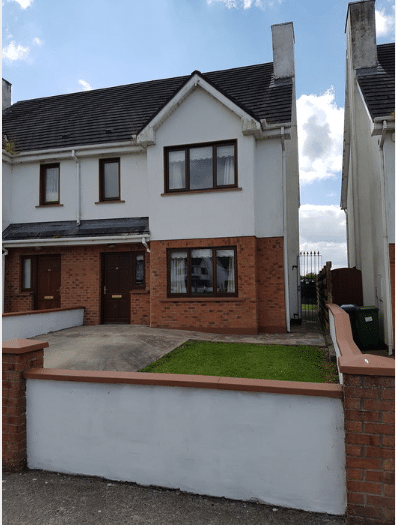
Here is one that has been done up and is on the market for 167,000€
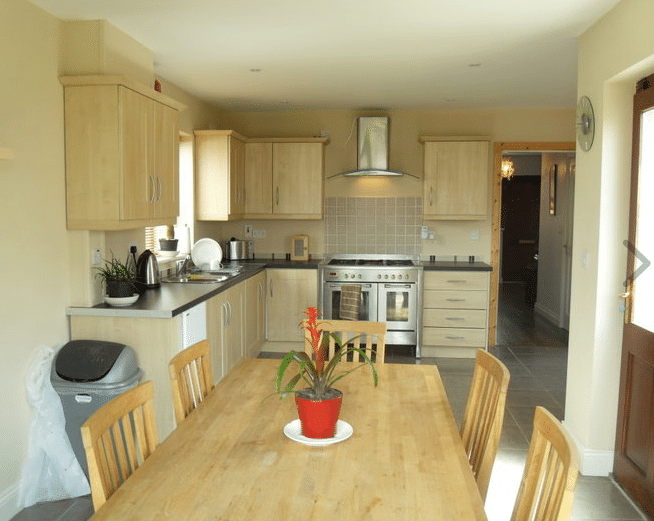
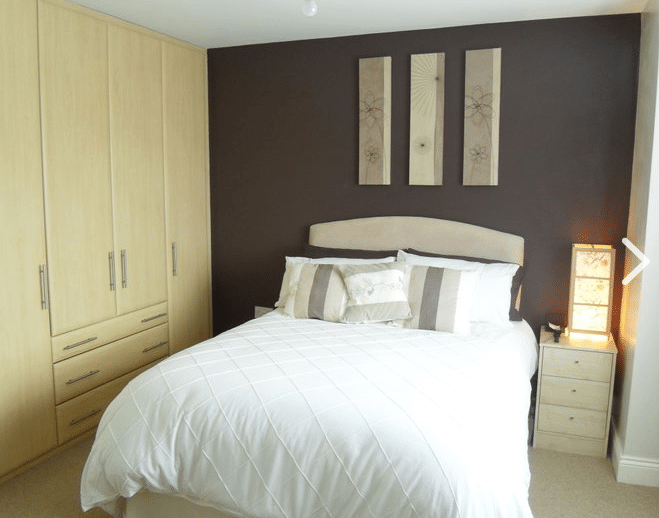
We could sell our current home, buy one of the cheaper ones in cash and be mortgage free with added money to reinvest. This would reduce our living expenses to 25,000€/year.
This option would enable us to have one person stay home while the other could continue working a professional role full time in Limerick (a 40 minute commute) and continue working towards full FI for both of us while at the same time, reducing our current expenses and simplifying our lifestyle as one person would be home with our son and able to mind the house and cook etc.
It also means that once we are FI, we can stay in Ireland full time if we wish or spend extended periods abroad while potentially renting out our house (or leaving it vacant if we wish).
Annual expenses: 27,000€ (25k + 2k for additional commute)
Income to supplement: as above
Years to full FI: 7
Both work full time, sell home when nearing FI and move somewhere cheaper
As I didn’t overly like the idea of commuting 40 minutes or more for the next 7 years, I thought I’d look at the moving to the countryside option in another way. What if we both worked full-time and stayed in our current home, put our son in childcare and only once we were nearing FI, then free up the equity in our current home and move to the countryside then when commuting would no longer be required, but also would reduce our living expenses and time to FI.
Annual expenses once FI: 25,000€
Income to supplement: as above
Years to full FI if we buy an 80,000€ home: 5.5
Years to full FI if we buy an 60,000€ home: 5.25
Buy mobile home within commuting distance, both work and rent out our current home during the summer
I recently came across a news article where a local designer bought a mobile home to put on her parents land while she saved for a down payment. This sent me off into another research and number crunching rabbit hole.
Here is what I found.
If you’ve got a serviced site where you can put a mobile home and you don’t mind living in a small space (though some are just as big as a decent apartment, have a look at some of these modern luxury ones) – then this might be a cheaper immediate option. The added bonus with your own site is that you can get internet and laundry installed which you can’t do in a caravan holiday park.

If you don’t have a serviced site, then it probably would cost too much to buy one and get it serviced to justify this option but you could buy one in a serviced holiday park however these are only open 7 months of the year (usually Apr-Nov) and the major downside (and ultimately what has ruled this out for us) is that you can’t get internet and there are no laundry facilities in the mobile homes or at the site (at least the ones I looked at).
You can buy a 3 bed for about 20,000€ and a two bed for slightly less (though I’m not sure the quality would be like those above for that price). The annual service fees are about 2,500€.
Taking all this into consideration, I looked at the option of saving less this year and buying one of these now, both of us returning to work including the increased cost of childcare, renting out our current home while we could be at the caravan park and moving back to our home in the off-season. There is a caravan park that would be 25 minutes from my workplace and 40 minutes from my husbands.
Annual expenses: 50,000€ pre early childcare scheme, 46,500€ post ECCE until school, then 40,000€ once in school (estimated 3,000€ extra/year for additional commute costs)
Income to supplement: as above
Years to full FI: 5.5
Considerations: Though the years to full FI are short, there are a lot of moving parts, we’d need to rent our home for 6 months every year for the next 5.5 years and move between 2 homes every 6 months while both working and having our son in childcare and school. We’d also need to sacrifice having internet for 6 months and have to do our laundry at a laundromat for 6 months for the next 5 years. There is also added commute time and costs for my husband. This is not something we are prepared to sacrifice in order to shave a few years off of our goal. It would make our lives more complicated rather than simplifying which is the ultimate goal, not necessarily to be financially free as quickly as possible, though it may work for some of you which is why I included it.
Both work until nearing FI then sell home, buy mobile home in Ireland and live abroad in off-season
These headings are becoming paragraphs! Ok so while looking at the option of the caravan parks in Cork, I also considered doing the same where we stay in our current home, both of us work, put our son in childcare and continue working towards full FI but once we are nearing that goal, sell our current home and at that point buy the mobile home in Cork (or elsewhere in the country as commute would no longer be an issue). During the off season then, as we would no longer have our home in Cork, we could live abroad somewhere warmer during the winters which also reduces our living expenses and time to FI.
Annual expenses: 50,000€ pre early childcare scheme, 46,500€ post ECCE until school, then 37,000€ once in school
Income to supplement once FI: 23,000€ (10k for 6 months abroad, 13k (half of 26k) for remaining mortgage free months in Ireland
Years to full FI: 4.5
Considerations: This significantly reduces the effort while saving towards FI as we get to stay in our current home, but the offset is we put our son into childcare. It also means once we are FI, we’d be living in 2 places and moving every 6-7 months as the caravan park would only be open for 7 months. This would mean we would need to homeschool our son, but if we were both off work this is something we are considering anyway.
Both work to FI then move to caravan park in Spain year round
We personally would like to stay in Ireland for part of the year but for curiosity’s sake I looked into what you could get in Spain in terms of caravan parks. This is by no means extensive research but as an example you could get a pretty decent modern 3 bedroom caravan for 50,000€, annual site fees of 3,600€.
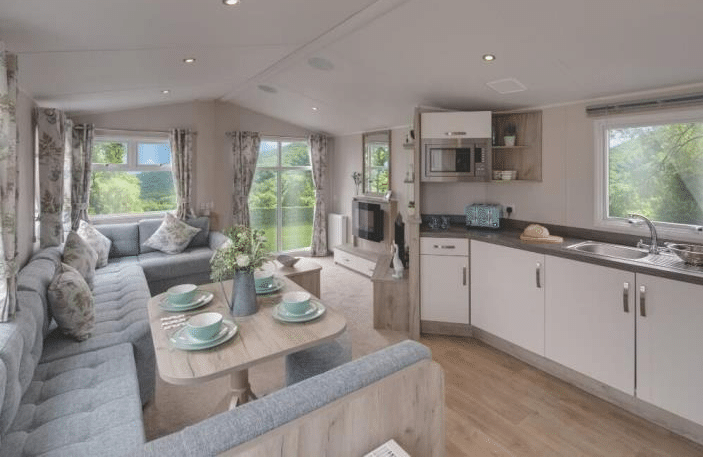
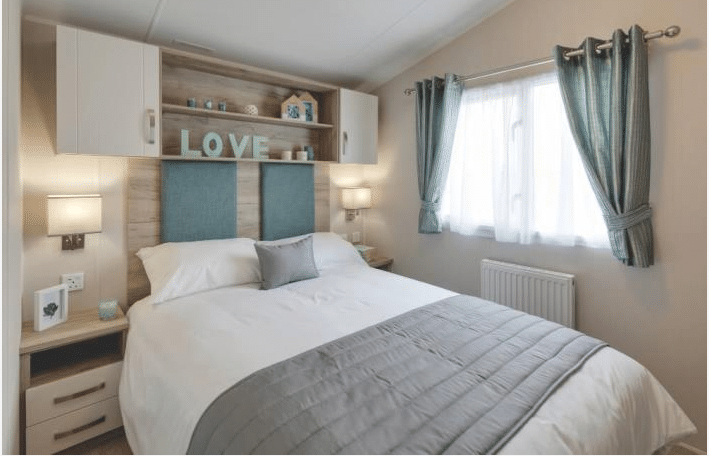
This particular site is 25 mins from Malaga airport which you can get to quite cheaply (as low as 50€) with direct flights (around 3 hours) from Dublin and Cork (for easy visits with friends/family) – that’s less time and less expensive for one person than it is to drive to Dublin from Cork! The site is open year round and has it’s own pool and bar/restaurant, there is a nearby village as well with standard shops you would require. This site does come with internet, though not sure about the speed. I don’t see anything about laundry either in the mobile home nor on site so that would be a tricky thing unless you could have one installed.
This option seems to be the quickest in terms of reaching full FI at a whopping 3 years at our current savings rate, at which point we’d need to sell our home and invest the rest.
Annual expenses: 18,000€ (no mortgage or rent and low cost of living in Spain)
Income to supplement: as above
Years to full FI: 3
Ways to live semi-retired now
If none of those are quick enough, here are a few options to consider by living a semi-retired life now.
Pause savings towards FI and move to caravan park in Spain where one person works part-time
Hinging off the moving to Spain option above, we could technically do that now (or within a year once we get everything organised) as we could sell our current home, buy the mobile home outright and have some to spare for re-investment. If we drew down on our existing assets we’d only need to make around 10,000€ more per year to live there year round. One or both of us could work part-time in the local village to bridge this gap while alternating who stays home with our son, or just one of us could work.
Annual expenses: 18,000€
Income to supplement: 10,000€ net
Years to full FI: Indefinitely on hold
Pause saving towards FI and live off one income until baby is in school
If you have a partner and you’ve managed to get up to a joint 50% savings rate or more then the option of living off one income (while still saving, albeit smaller amounts) could be available to you, keeping in mind that you could take home more from your partner’s income once they have use of your tax credits (if they are in the higher tax bracket) and you use the home carer credit (if you are minding a child).
For example: a married couple with one person working and the other staying home to mind a child where the person earning makes 50,000€ or more would take home about 2,600€ more than when that person was assessed as an individual or when both were working and jointly assessed. If they are in the lower tax bracket like say 40,000 or below the additional take home will be less (1,740€ additional take home for 40,000€ joint assessment).
We are lucky enough to be in a position to do that and so one option we are considering is for one of us to stay off work with our son until he is school aged, at which point we both return to work and continue saving towards FI at that point.
Our current assets would remain untouched (unless we needed to access for an emergency) and would continue compounding even though we wouldn’t be pursuing FI as aggressively.
We would stay in our current home but have also included the option of selling our home once we are nearing FI and buying somewhere cheaper (as commuting would no longer be necessary) which would lower our living expenses. This shaves 3.5 years off the end goal!
Annual expenses: 37,000€
Income to supplement: 37,000€ net (42,500€ gross)
Years to full FI staying in our current home: 10 years
Years to full FI selling our current home and buying a home in cash somewhere cheaper once nearing FI: 7.5 years
Stop saving towards full FI, one person stays off, the other works part-time
As we currently have existing assets we could draw from, we could stay in our current home, begin drawing from our existing assets and have enough to get by on one part-time income (3 days a week) or by taking on short term contracts. This means we would stop working towards full FI potentially indefinitely if this is the lifestyle we choose to pursue OR until circumstances change and we wish to return to full time work, potentially once baby is in school.
This would reduce the compounding effect of our existing assets and would take longer to reach full FI should we want to resume that but means we can take a step back now while our son is small and have an easier life with both of us being home 4 days of the week (and one full time). That being said, it might be hard to find part time work at the same level of income OR as most people will attest that do part-time, you actually still end up doing 5 days work in 3 and are only being paid for 3 so that might not be the best / most sustainable option for attaining a slower paced, less stressful life.
Annual expenses: 37,000€
Income to supplement: 30,000€ net (33,000€ gross)
Years to full FI: Unknown depending on when we’d chose to return to full time work.
Stop saving towards full FI, sell current home, buy house somewhere cheaper, one person works part-time
Hinging off the Tipperary option where we sell our current home and buy one in cash with the equity, reducing our living expenses to 25,000€ and if we both worked for one more year and saved our current savings rate, we’d have enough in assets to draw down 10,000€ in passive income. This would leave 15,000€ to supplement our current lifestyle (15,800€ gross).
This would give us options to either both work part-time locally, only one person work part-time in a professional role with a commute or even full-time in a minimum wage role locally if that suited which would bring home almost 18,000€/year (potentially with less stress and responsibility than current roles). Mr. MH often jokes that his dream job would be to stack shelves in Dunnes as he did in college so who am I to stop him following his dreams!
We also looked at the option of doing this and moving abroad for 6 months of the year where we could live more cheaply. However it only reduced expenses by another 2,000€ per year so might not be worth the hassle of trying to find jobs for 6 months at a time.
As with the previous option, this stops all savings towards full FI but allows us to live a simpler life for the moment. We could play it by ear and always have the option to return to work and continue savings should we wish to do so.
The particular location is handy as it’s closer to some family and friends and fairly close to both Cork and Limerick.
Annual expenses: 25,000€
Income to supplement: 15,000€ net (15,800€ gross)
Years to full FI: Unknown depending on when we’d chose to return to full time work.
Stop saving towards full FI, rent out current home and rent somewhere cheaper while one person works
I worked out that renting out our current home could net us 10,600€/year after an income tax rate of 6% (since only one of us would be working and only making enough to cover our expenses). If we drew down on our existing assets to further supplement our income and could find somewhere to rent for 600€/month elsewhere in the country (Longford/Sligo/Donegal seems to be the main areas where you could get a decent place for a family for this) then we’d only need to supplement our income by 26,900€ (down from 37,000€). If one of us could find a job in those areas earning 50,000€ then we could afford to work 3 days a week, or full time in a job earning 30,000€ gross and the other could stay home with our son.
The downside to this would be that we would need to be landlords from a distance. In addition, any vacant months or bigger repairs would cause us to dip further into our assets to cover the gap.
Again this is stopping our journey to FI for the moment, but doesn’t mean we couldn’t start savings towards it again once our son is in school or we choose to both return to full time work.
Annual expenses: 26,900€
Income to supplement: as above (30,000€ gross)
Years to full FI: Unknown depending on when we’d chose to return to full time work.
Summary table
And to sum that all up, here is a handy table with the years to full FI for each scenario.
| Saving towards FI scenarios | Years to Full FI |
| Both work to full FI without pension | 8.75 |
| Both work to full FI with pension | 6 |
| Both work to full FI without pension but renting spare room | 8.25 |
| Both work to full FI with pension and renting spare room | 5.75 |
| Both work to full FI without pension living 6 months abroad not renting out home | 7 |
| Both work to full FI with pension living 6 months abroad not renting out home | 5 |
| Both work to full FI without pension living 6 months abroad and renting out home | 5.75 |
| Both work to full FI with pension living 6 months abroad and renting out home | 4.25 |
| Sell all assets, pay off mortgage, stay in Cork on FI not renting spare room | 8.25 |
| Sell all assets, pay off mortgage, stay in Cork on FI with renting spare room | 8 |
| Sell all assets, pay off mortgage, move somewhere cheaper when nearing FI | 6.25 |
| Sell current home, buy house somewhere cheaper, one person works full-time | 7 |
| Both work full time, sell home when nearing FI and move somewhere cheaper (80,000€ home) | 5.5 |
| Both work full time, sell home when nearing FI and move somewhere cheaper (60,000€ home) | 5.25 |
| Buy mobile home within commuting distance, both work and rent out our current home during the summer | 5.5 |
| Both work until nearing FI then sell home, buy mobile home in Ireland and live abroad in off-season | 4.5 |
| Both work until nearing FI then move to caravan park in Spain year round | 3 |
| Pause saving towards FI and live off one income until baby is in school, stay in Cork once FI | 10 |
| Pause saving towards FI and live off one income until baby is in school, move somewhere cheaper once FI | 7.5 |
And here is a summary of the semi-retirement options. They have varying levels of income that would need to be supplemented.
| Semi-retired Scenarios | Income to supplement (net) |
| Pause savings towards FI and move to caravan park in Spain where one person works part-time | 10,000€ |
| Stop saving towards full FI, one person stays off, the other works part-time | 30,000€ |
| Stop saving towards full FI, sell current home, buy house somewhere cheaper, one person works part-time | 15,000€ |
| Stop saving towards full FI, rent out current home and rent somewhere cheaper while one person works | 26,900€ |
And that’s all I’ve come up with so far. Hopefully that has given some food for thought. Do let me know if you have any other scenarios you’d like me to run through.
Super breakdown of FI options.
Really useful to open the mind.
Thank you for sharing
In the base case “Both work to full FI” with 50k expense, what is the net income after tax in Ireland?
Thank you 🙂 In order to have 50k net income, you’d need to both be earning 30k just to cover your expenses (so 60k total). If you’re saving towards FI you’d want to be earning 60k each or more (or some split of that) so that you’d be able to save the other income – though the income tax is higher then so earning 120k total nets you 83k meaning you’d have 33k to invest rather than an additional 50k. Here is the calculator I use if you want to play around with some other scenarios https://download.pwc.com/ie/budget-2020/income-tax-calculator.html. Any other questions give me a shout 🙂
Dear Meagan
Have you looked at the Cheap Irish Houses website and Instagram page? Maggie from Co. Tipp does all the ‘hard yards’ finding properties < €100k. She also offers a €5 monthly subscription. Best of luck in your FIRE journey. Avoid analysis paralysis and jump in.
Jeff
Hi Jeff, thanks for that! Would you believe my Dad in Canada actually told me about that site a while ago? It seems most of those are fixer-uppers which I am not in the market for. I’m more interested in what you could buy that’s move-in ready with a decent BER rating. I definitely suffered from analysis paralysis but think I’ve gotten off the fence now and am focusing on paying off our mortgage and will then invest in ETFs. We still daydream and go down random rabbit holes when looking at other options but at least are working towards something and should we change direction at some stage, so be it.